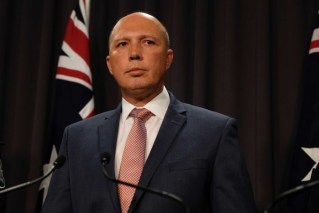Fast track for low risk investments as Chalmers pulls the levers on foreign buyers
Foreign investment proposals with implications for Australia’s strategic or economic security will face tougher scrutiny, under a policy overhaul to be announced by Treasurer Jim Chalmers on Wednesday.

'Nothing up my sleeve': Treasurer Jim Chalmers delivers last year's post-budget address at the National Press Club (AAP Image/Lukas Coch)
At the same time, the government will process faster proposals in non-sensitive areas from known investors with a good compliance record.
Among them will be foreign investors in build-to-rent properties.
Chalmers, outlining the new “risk-based” approach for foreign investment in a speech released ahead of delivery, says national security threats are increasing as geopolitical competition intensifies.
“Risks to Australia’s national interests from foreign investment have evolved at the same time as competition for global capital is becoming more intense,” he says.
Foreign investment is where “the stovepipes of economic and national security have often failed to meet in the past”.
The revamped policy is partly driven by a need to respond to a more threatening and expansive China, but also reflects a generally changing international environment with its intense competition for investment capital.
More monitoring of sensitive investments
The treasury will be given more resources to scrutinise investment proposals in critical infrastructure, critical minerals, critical technology, and those involving access to sensitive data, as well as those near defence sites.
Its investment compliance team will be bolstered to ensure better monitoring and enforcement of conditions placed on investments, including on-site visits.
Treasury will also be provided with additional resources to detect and call in investments that come to pose a concern to national security over time.
In an effort to ensure foreign investors pay their proper tax, there will be greater scrutiny of overly-complicated tax arrangements.
“We will update the framework on emerging risks,” the treasurer will say.
“This will improve the conditions we put on transactions, how we respond more quickly to behaviour designed to avoid scrutiny, and make sure that all this aligns with our other regulatory frameworks.”
There will be greater efforts across government to identify and deal with emerging risks.
For low-risk investors, approval times and compliance costs will shrink.
In assessing an application to be low risk, treasury will consider the investor, the target of the investment and the structure of the transaction.
Less paperwork will be required of repeat investors where the ownership information hasn’t changed.
Treasury will have a target of processing 50% of cases within the initial statutory timeframe of 30 days from January 1 2025.
The changes to the foreign investment rules will “strengthen where we need to and streamline where we can, to make it more robust, more efficient and more transparent,” Chalmers says.
Guardrails around Future Made in Australia
In his speech, to the Lowy Institute, Chalmers also outlines guardrails around the government’s new Future Made in Australia interventionist industry policy.
The latest initiative in this policy has been a $940 million joint Commonwealth-Queensland investment in a quantum computing venture, PsiQuantum, announced by Prime Minister Anthony Albanese on Tuesday.
“Where markets are nascent or don’t yet exist, there can be a case for targeted, temporary support to crowd in private investment – especially in industries that meet strict criteria,” Chalmers says.
“For us, this rigour will be imposed by the Future Made in Australia Act that the PM flagged last month.”
Five tests will be set for where and how the government acts, Chalmers says.
“First, is the industry one where we can be competitive, and more productive?
“Second, does it contribute to an orderly path to net zero?
“Third, can it build the capabilities of our people and especially our regions?
“Fourth, will it improve Australia’s national security and economic resilience?
“And fifth, does it recognise the key role of the private sector and deliver genuine value for money for government?”
The Future Made in Australia Act will also establish criteria for two streams of projects in line for government assistance.
A national interest stream, where domestic sovereign capability is needed to protect national security interests or ensure the economy is resilient enough to shocks. This would focus on only the most critical risks, not all risks.
A net zero transformation stream, where industries support decarbonisation, and there is a reasonable prospect of a comparative advantage.
“Our initial focus – on refining and processing critical minerals, producing renewable hydrogen, exploring production of green metals and low carbon liquid fuels, and supporting targeted manufacturing of clean energy technologies including value adding in the battery supply chain – reflects this rigour,” Chalmers says.
“Critical technologies like quantum computing are essential here.”
But, with considerable criticism coming of the government’s interventionist approach, Chalmers is anxious to spell out what he sees as the limits of the policy.
“Nobody is claiming we have the scale to compete in every industry.
“Nobody is saying that these interventions will be permanent, or that we should retreat from trade, or make every one of the goods that we need here.
“Nobody is saying we need to outspend or compete dollar for dollar with the scale or internal markets of bigger economies.
“And nobody is saying that this will involve solely public investment.
“Public investment, important and substantial, is a key – to help unlock the hundreds of billions of private capital we’ll need to deploy.”












